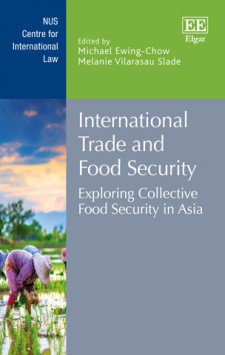
International Trade and Food Security: Exploring Collective Food Security in Asia
Food security is one of the greatest challenges of our time. The food price crisis of 2008 exposed the vulnerabilities of the global food system. Governments across Asia acerbated the crisis by imposing export restrictions based on a policy of self-sufficiency.
This book assesses whether self-sufficiency is an adequate response to the food security challenges we face. Pricing volatility drives isolationism at a time when climate change and increasingly uncertain weather patterns make it difficult for any single nation to guarantee adequate food production for itself.
Through a collection of commissioned studies which draw upon the experience of leading experts and scholars in trade, investment, law, economics, and food policy, this book analyses the impact of this trend on the most essential crop in the Asian region—rice.
It suggests that food security policy should be reconceptualised: from the national to the regional and even the global level. It also provides its own proposals as to how this new paradigm of collective food security should be understood and developed.
The book calls for a new conversation in the region, acknowledging that the challenges we face are global and the solutions must be found in collective action. This state-of-the-art study will appeal to lawyers, economists and political scientists, as well as trade and food security specialists by providing expert analyses and enlightening solutions for the future.
About the NUS Centre for International Law book series
This book series provides critical analysis on issues of international law relevant to the region, including ocean law and policy, ASEAN law and policy, trade and investment law and policy, and international dispute resolution. The series examines international issues from a legal, political and policy perspective, and serves as a valuable reference for international and regional organisations, government officials, scholars and practitioners.

